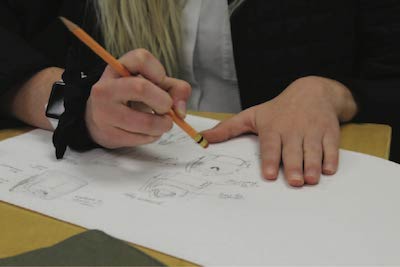
OPDD students took designs from concept to prototype
Over the course of an afternoon, students from the Outdoor Product Design and Development program helped designers from local consumer products company, Little Unicorn, to develop new ideas. Students spent close to four hours in a “design sprint” to rapidly create new product concepts and prototypes for potential production and sale.
Little Unicorn, a consumer products company focused on designing products for babies and kids, approached the OPDD program about collaborating with students to work with their designers to develop new product ideas. Students were split into groups and created new concepts for products based on design briefs provided by the company.
Connor Young, a project coordinator for the company, explained the origin of the partnership.
“Our creative director wanted to have a day away from our day-to-day projects and to really just have an outlet for some new product opportunities,” Young said. “We also wanted to have a refreshing collaborative experience, and what better way to do that than utilize the creatives on campus in the OPDD program.”
Young said OPDD students have much to offer because of their training, state-of-the-art facilities and tools for the development process.
“We had the idea of trying to take a product as far as we could in four hours from initial sketch to functioning prototype,” Young said.
The company was looking for an outside perspective from creative students who also have the skills to not only sketch a concept, but prototype those products in the OPDD labs. The alternative for most companies is to send sketches or digital designs to a factory in order to produce a sample, which can take weeks to receive. In-house prototyping helps students to work with local companies to refine their ideas before they send something to a factory, leading to quicker turnaround times, and a more accurate sample.
By the end of the afternoon, students were able to present physical prototypes of their concepts to senior management.
“The students did not disappoint!” Young said. “We were thrilled with the outcome and hope to have more workshops in the future.”
Students walked away with an opportunity to work with talented designers from industry as well as a portfolio piece from a real-world project that will prepare them for meaningful careers.
Industry collaborations made possible through the Manufacturing and Outdoor Products Support Hub, a partnership between Utah Manufacturing Extension Service and Outdoor Product Design & Development.

